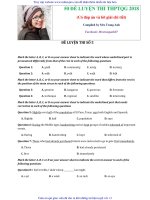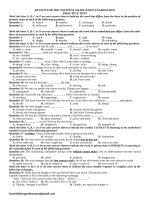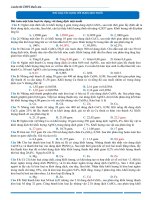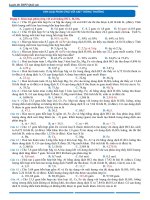đề luyện thi THPTQG 01
Bạn đang xem bản rút gọn của tài liệu. Xem và tải ngay bản đầy đủ của tài liệu tại đây (76.92 KB, 6 trang )
PRACTICE 1
I. Choose the one word or phrase – a, b, c or d – that best completes the sentences.
The Games impressed sports enthusiasts __________ its spirit: solidarity, co- operation for peace and
development.
A. for
B. about
C. with
D. on
2.
They will have opportunity to participate __________ the 25th Sea Games next year.
A. on
B. at
C. to
D. in
3.
Thanks__________ their talent and determination, the Vietnamese Women's Football Team successfully
defended the Sea Games title.
A. to
B. for
C. of
D. about
4.
The champion successfully __________ his title against the American challenger.
A. protected
B. defended
C. retained
D. won
5.
The 25° Sea Games will be held in Lao. It is Lao's first time as the __________ for the games.
A. host
B. competitor
C. supporter
D. participant
6.
In November, 1997, Brunei was _______ as official member, raising total of official members to 10.
A. proposed
B. organized
C. recognized
D. presented
7.
Thailand is our strongest _______ in Southeast Asia's Men's Soccer.
A. athlete
B. rival
C. spectator
D. player
8. You have to be highly ________ to do well in sport these days.
A. competed
B. competitor
C. competition
D. competitive
9.
The SEA Games __________ every two years, with 11 countries in Southeast Asia participating.
A. comes down
B. sets up
C. takes place
D. brings about
10. In the 22nd Sea Games, Vietnamese athletes showed __________ and commitment.
A. enthusiasm
B. enthusiastic
C. enthusiast
D. enthusiastically
11. The two children tried _______ they could to bring about a reconciliation between their parents.
A. as hardly as
B. so hard as
C. as hard as
D. harder than
12. Gilbert Stuart is considered by most art critics _____ portrait painter in the North American colonies.
A. the greatest
B. as greatest
C. greatest
D. who was the
13. The United States has ________ Japan.
A. twice more people than
B. twice as many people as
C. as many twice people as
D. as many people as twice
14. They are not interested in reading poetry, ___________ in writing it.
A. little more
B. more less
C. much less
D. much more
15.
_________ 1.000 species of fish have been identified.
A. Much as
B. As many
C. As much as
D. As many as
16. The more he tried to help her, ____________ she seemed to appreciate it.
A. the lesser
B. less
C. lesser
D. the less
17. The curriculum at the public school is as good __________ of any private
A. or better than
B. as or better than that
C. as or better that
D. as of better than those
18. She practices playing the piano ___________
than I do.
A. more regularly
B. most regularly
C. quite regularly
D. as regularly
19. We have kept this seat for you. It's _________ comfortable chair we have.
A. the more
B. the most
C. the very much
D. much too
20. The ears of African elephants are ___________ Indian elephants.
A. bigger than
B. bigger as
C. bigger than of
D. bigger than those of
21. Subtropical zones ___________ temperate zones, but they still have distinct summer and winter
seasons.
A. that are warmer
B. warmer
C. are warmer as
D. are warmer than
22. Of all the candidates, Peter is probably __________.
A. the less qualified
B. qualified less
C. the most little qualified
D. the least qualified
23. Of the two students, Sarah is the ___________.
A. most intelligent
B. more intelligent
C. intelligent
D. most intelligently
24. It was almost as if the wolf was __________ of us than we were of it.
1.
A. scared
B. scareder
C. more scared
D. most scared
25. The more we learn
____________.
A. we become wise
B. we become wiser
C. wiser we become
D. the wiser we become
II. Complete the sentences, using the structure comparative + and+ comparative.
1. The company expanded rapidly. It grew ……………………………….. all the time. (big)
2. Cathy got ……………………………….. in her job. In the end she left. (bored)
3. My bags seemed to get ……………………………. as I carried them. (heavy)
4. As I waited for my interview, I became ………………………….. (nervous)
5. As the day went on, the weather got ………………………………... (bad)
6. Health care is becoming ……………………………... (expensive)
7. As the conversation went on, Paul became ………………………. (talkative)
8. These days …………………….. people are learning English. (many)
9. The company's share price went ……………………….. (high)
10. Life got ………………….. for boss Bob Watts as the company became…………………… (good –
successful)
II. Rewrite the sentences, using the ... the
1. The crowd became increasingly angry at the long delay.
……………………………………………………………………………………………………………..
2. The value of a picture depends on how famous the artist is.
……………………………………………………………………………………………………………..
3. How well I sleep depends on how late I go to bed.
……………………………………………………………………………………………………………..
4. I don't spend much time with my family because I work so hard.
……………………………………………………………………………………………………………..
5. The traffic moves very slowly as more cars come into the city.
……………………………………………………………………………………………………………..
6. How much you sweat depends on how hot you get
……………………………………………………………………………………………………………..
7. The idea becomes less attractive as I think about it more
……………………………………………………………………………………………………………..
8. How much petrol a car uses depends on the size of the engine
……………………………………………………………………………………………………………..
9. It's hard to concentrate when you are tired
……………………………………………………………………………………………………………..
10. The service of a hotel depends on how expensive it is
……………………………………………………………………………………………………………..
TEST
I. Pick out the word whose underlined part is pronounced differently from that of the others.
1. A. visited
B. tried
C. decided
D. protected
2. A. effort
B. species
C. protect
D.benefit
II. Mark the letter A,B,C or D on your answer sheet to indicate the word whose stress is different from
the rest of the others in each of the following questions.
3. A. generation
B. vulnerable
C. conservation
D. disappearance.
4. A. alcohol
B. dangerous
C. surgery
D. effective
III. Choose the one word or phrase which must be changed in order for the sentence to be correct.
5.The books writing by Mark Twain are very popular in the world.
A
B
C
D
6.John took off his shoes so as to not make any noise.
A
B
C
D
7.Had I heard the news last night, I would tell you about it.
A
B
C D
IV. Mark the letter A,B,C or D on your answer sheet to indicate the correct answer to each of the
following questions .
8. If you don’t know what a word means, look it……….in the dictionary.
A. off
B. up
C. about
D. at
9. …………….you study for these exams,……………….you will do.
A.The harder / the better
B. The more / the much.
C. The hardest / the best
D.The more hard / the more good.
10. John :“ I’ve passed my final exam” – Tom : “……………………..” .
A. Good luckB. It’s nice of you to say so. C. That’s a good idea
D. Congratulation!
11. Be careful with these scrissors ! Don’t point them………..me.
A. for
B. in
C. with
D. at
12. Peter “ Thanks a lot for your wonderful gift ”- Mary “……………”
A.You are welcome
B.Thank you
C.Cheers
D.Have a good day
13. Books are a wonderful……………of knowledge and pleasure.
A. way
B. information
C. source
D. type.
14. Worldwide commercial……………of animals for food and other products has seriously reduced the
number of rare species.
A. exploration
B. breeding
C. killing
D. exploitation
15. After you write your report, give it to your boss. He will…………it and make any necessary changes.
A. fill in
B. bring up
C. look after
D. go over.
16. The boys…………tennis overthere are my new neighbour.
A. who plays
B. playing
C. that playing
D. are playing
17. If Mary…………to sit in for us, we ………….to the movie yesterday.
A. had agreed / would have gone
B. has agreed /would have gone.
C. had agreed / would go
D. agreed /would have gone.
18. Ann “ Do you know where the Browns are ? ”.
Jane “ I think they………….to London ”
A. should go
B.must be going
C.could have gone
D. may be going.
19. Dometics chore will no longer be a burden thanks to the invention of ………….devices.
A. save-laboring
B. labor-saving
C.saving-labor
D.laboring-save
20. My grandmother takes ……………for keeping house.
A. probability
B. ability
C.possibility D. responsibility
21. John asked me ………….in English.
A. what that word meant
B. what did that word mean
C. what that word means
D. what does this word mean.
V. Mark the letter A, B, C, or D on your answer sheet to indicate the word/phrase that is CLOSEST in meaning to
the underlined part.
22. After her mother died, she was raised by her grandparents.
A. brought up
B. come into
C. grown up
D. put up
23: Many plant and animal species will be in danger if we don't take any actions to protect them.
A. on purpose
B. at ease
C. at stake
D. in advance
VI. Mark the letter A, B, C, or D on your answer sheet to indicate the word or phrase that is OPPOSITE in
meaning to the underlined part in each of the following questions.
24. Billy, come and give me a hand with cooking.
A. help
B. prepared
C. be busy
D. attempt
25. Whenever problems come up, we discuss them frankly and find solutions quickly.
A. happen
B. encounter
C. arrive
D. clean
VII. Choose one option A, B, C or D corresponding to the sentence which has the same meaning as the
original one.
26. He only feels happy whenever he doesn’t have much work to do.
A. The more he works, the happier he feels
B. He feels happier and happier with his job
C. The less he works, the happier he feels
D. His work makes him feel happy.
27. They think that the owner of the house has gone abroad.
A. The owner of the house is thought to go abroad.
B.The owner of the house is thought to have been going abroad.
C.The owner of the house is thought to have been gone abroad.
D.The owner of the house is thought to have gone abroad.
28. The heavy rain stopped me from going out.
A. As the heavy rain, I couldn’t go out.
B. Thanks to the heavy rain, I couldn’t go out.
C. Because of the heavy rain, I couldn’t go out. D. Except for the heavy rain, I couldn’t go out.
29. Dad came home. He went out again soon.
A. No sooner had Dad come home than he went out again.
B. As soon as Dad came home, he went out again at once.
C. Hardly did Dad come home when he went out again.
D. The time Dad came home, he went out again right then.
30. Mum bought a lottery ticket. She won a big prize three days later.
A. After Mum had bought a lottery ticket three days, she won a big prize.
B. Three days after Mum had bought a lottery ticket, she won a big prize.
C. Mum bought a lottery ticket three days after she had won a big prize.
D. Before Mum won a big prize three days, she had bought a lottery ticket.
VIII. Read the following passage then choose the best answer to complete each gap.
In 1973, when the tiger appeared to be facing extinction, the World Wide Fund for Nature and the
Indian Government agreed to set …(31)….”Operation Tiger”-a campaign to save this …(32)… creature. They
started by creating nine special parks …(33)…. tigers could live safely. The first was at Ranthambhore, a region
which was quickly turning into a desert …(34)…. too much of the grass was being eaten by the local people’s
cattle. At the time there were just fourteen tigers left there. The government had to clear twelve small villages,
which meant moving nearly 1, 000 people and 10, 000 cattle so the land …(35)….. be handed back to nature.
31. A. on
B. up
C. in
D. down
32. A. damaged
B. destroyed
C. frightened
D. threatened
33. A. in case
B. for fear
C. so that
D. because
34. A. because
B. when
C. if
D. while
35. A. must
B. can
C. could
D. might
IX. Reading comprehension : Choose the item (A, B, C or D) that best completes the unfinished
statement (or the best answers) about each passage.
Today’s cars are smaller, safer, cleaner, and more economical than their predecessors, but the car of the
future will be far more pollution-free than those on the road today. Several new types of automobile engines
have already been developed than run on alternative sources of power, such as electricity, compressed natural
gas, methanol, steam, hydrogen, and propane. Electricity, however, is the only zero-emission option presently
available.
Although electric vehicles will not be truly practical until a powerful, compact battery or other dependable
source of current is available, transport experts foresee a new assortment of electric vehicles entering everyday
life: shorter-range commuter electric cars, three-wheeled neighborhood cars, electric delivery vans, bikes and
trolleys.
As automakers work to develop practical electrical vehicles, urban planners and utility engineers are
focusing on infrastructure systems to support and make the best use of the new cars. Public charging facilities
will need to be as common as today’s gas stations. Public parking spots on the street or in commercial lots will
need to be equipped with devices that allow drivers to charge their batteries while they stop, dine, or attend a
concert. To encourage the use of electric vehicles, the most convenient parking in transportation centers might
be reserved for electric cars.
Planners foresee electric shuttle buses, trains, buses and neighborhood vehicles all meeting at transit centers
that would have facilities for charging and renting. Commuters will be able to rent a variety of electric cars to
suit their needs: light trucks, one-person three-wheelers, small cars, or electric/gasoline hybrid cars for longer
trips, which will no doubt take place on automated freeways capable of handling five times the number of
vehicles that can be carried by freeway today.
36. The following electrical vehicles are all mentioned in the passage EXCEPT
A. vans
B. trolleys
C. trains
D. planes
37. The author’s purpose in the passage is to
A. narrate a story about alternative energy vehicles
B. support the invention of electric cars
C. criticize conventional vehicles
D. describe the possibilities for transportation in the future
38. The passage would most likely be followed by details about
A. pollution restrictions in the future
B. automated freeways
C. electric shuttle buses
D. the neighborhood of the future
39. In the second paragraph, the author implies that
A. a dependable source of electric energy will eventually be developed.
B. everyday life will stay much the same in the future.
C. a single electric vehicle will eventually replace several modes of transportation
D. electric vehicles are not practical for the future
40. According to the passage, public parking lots of the future will be
A. as common as today’s gas stations
B. equipped with charging devices
C. more convenient than they are today
D. much larger than they are today
41. The word “charging” in this passage refers to
A. credit cards
B. lightning
C. aggression
D. electricity
42. The word “foresee” in this passage could best be replaced with
A. rely on
B. imagine
C. count on
D. invent
X. Read the following passage and mark the letter A, B, C, or D on your answer sheet to indicate the correct
answer to each of the questions.
During the seventeenth and eighteenth centuries, almost nothing was written about the contribution of
women during the colonial period and the early history of the newly formed United States. Lacking the right to
vote and absent from the seats of power, women were not considered an important force in history. Anne
Bradstreet wrote some significant poetry in the seventeenth century, Mercy Otis Warren produced the best
contemporary history of the American Revolution, and Abigail Adams penned important letters showing she
exercised great political influence over her husband, John, the second President of the United States. But little
or no notice was taken of these contributions. During these centuries, women remained invisible in history
books.
Throughout the nineteenth century, this lack of visibility continued, despite the efforts of female authors
writing about women. These writers, like most of their male counterparts, were amateur historians. Their
writings were celebratory in nature, and they were uncritical in their selection and use of sources.
During the nineteenth century, however, certain feminists showed a keen sense of history by keeping records
of activities in which women were engaged. National, regional, and local women’s organizations compiled
accounts of their doings. Personal correspondence, newspaper clippings, and souvenirs were saved and stored.
These sources form the core of the two greatest collections of women’s history in the United States – one at the
Elizabeth and Arthur Schlesinger Library at Radcliffe College, and the other the Sophia Smith Collection at
Smith College. Such sources have provided valuable materials for later generations of historians.
Despite the gathering of more information about ordinary women during the nineteenth century, most of the
writing about women conformed to the “great women” theory of history, just as much of mainstream American
history concentrated on “great men”. To demonstrate that women were making significant contributions to
American life, female authors singled out women leaders and wrote biographies, or else important women
produced their autobiographies. Most of these leaders were involved in public life as reformers, activists
working for women’s right to vote, or authors, and were not representative at all of the great mass of ordinary
women. The lives of ordinary people continued, generally, to be untold in the American histories being
published.
43. What does the passage mainly discuss?
A. The keen sense of history shown by American women.
B. The “great women” approach to history used by American historians.
C. The place of American women in written histories.
D. The role of literature in early American histories.
44. The word “contemporary” in the passage is closest in meaning to _______.
A. temporary
B. written at that time
C. belonging to the present time
D. past
45 In the first paragraph, Bradstreet, Warren, and Adams are mentioned to show that _______.
A. a woman’s status was changed by marriage
B. poetry produced by women was more readily accepted than other writing by women
C. only three women were able to get their writing published
D. even the contributions of outstanding women were ignored
46. The word “celebratory” in the passage means that the writings referred to were _______.
A. religious
B. serious
C. related to parties
D. full of praise
47. The word “they” in the passage refers to _______.
A. authors
B. efforts
C. counterparts
D. sources
48. In the second paragraph, what weakness in nineteenth-century histories does the author point out?
A. The sources of the information they were based on were not necessarily accurate.
B. They left out discussion of the influence on money on politics.
C. They were printed on poor quality paper.
D. They put too much emphasis on daily activities.
49. On the basis of information in the third paragraph, which of the following would most likely have been
collected by nineteenth-century feminist organizations?
A. Newspaper accounts of presidential election results.
B. Letters from a mother to a daughter advising her how to handle a family problem.
C. Biographies of John Adams.
D. Books about famous graduates of the country’s first college.
50. In the last paragraph, the author mentions all of the following as possible roles of nineteenth-century “great
women” EXCEPT _______.
A. activists for women’s rights
B. authors
C. reformers
D. politicians









